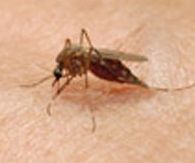Science News: Deadly Bites

The lowly mosquito causes panic with a West Nile outbreak and an EEE scare
by Catherine McNiff
Superstorm Sandy | Curiosity's Mission to Mars | Deadly Bites | Disease Reference Guides | Extreme Weather | Meningitis Outbreak Outbreaks of West Nile virus and Eastern equine encephalitis virus (EEE) sparked widespread mosquito paranoia in 2012. The year saw the largest outbreak of West Nile virus since 2003. EEE caused fewer fatalities but certainly fueled the fire of mosquito-bite dread. West Nile Virus OutbreakAs of November 27, 2012, 48 states had reported West Nile virus infections in people, birds, or mosquitoes. A total of 5,245 cases of West Nile virus disease in people, including 236 deaths, occurred. Of these, 2,663 (51%) were classified as neuroinvasive disease (such as meningitis or encephalitis) and 2,582 (49%) were classified as non-neuroinvasive disease. The 5,245 cases of 2012 is the highest number of West Nile virus events in almost a decade. Eighty percent of the cases were reported from 13 states (Texas, California, Louisiana, Illinois, Mississippi, Michigan, South Dakota, Oklahoma, Nebraska, Colorado, Arizona, Ohio, and New York) and a third of all cases were in Texas. EEEk!EEE is transmitted to humans and equines by the bite of an infected mosquito. EEE is an alphavirus that was first identified in the 1930s and current outbreaks have been localized mainly along the Eastern seaboard, the Gulf Coast, and some inland Midwestern locations. After a 4-10 day incubation period, victims may experience fever, muscle pain, and headaches leading to seizures and coma. There is a 33% fatality rate, with survivors often living with permanent brain damage. In 2012, there were 12 EEE fatalities in the U.S. Massachusetts had the most deaths with seven, followed by Vermont's two, with Florida, North Carolina, and Virginia each reporting one death each. Prevention is KeyThe Centers for Disease Control and Prevention (CDC) has this tagline on its website, "A single mosquito bite can make you sick. Why take a chance? Use repellent on yourself, your friends and your family." For mosquito-borne illnesses such as West Nile and EEE, certain precautions can minimize risk. First, limit outdoor evening activities during the mosquito "witching hours" between sundown to sunup. Second, when going outside, use repellents containing DEET, picaridin, IR3535, or the plant-based oil of lemon eucalyptus. Finally, some communities participate in community-wide insecticide sprayings. |
- More from 2012 Science News









